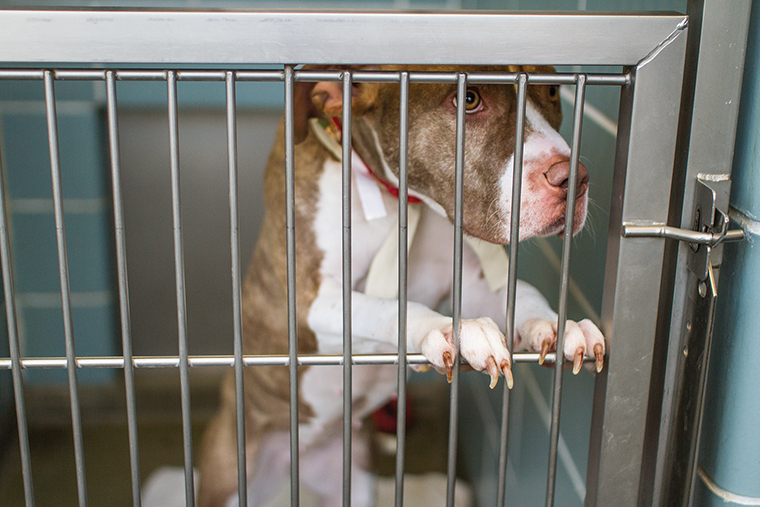City cracks down on puppy mills, pet stores
The Chicago City Council has introduced an ordinance to restrict the retail sale of dogs from large-scale commercial breeders.
February 17, 2014
To combat canine illnesses, overpopulated pounds and rising euthanization rates, an ordinance introduced to the City Council Feb. 5 would crack down on puppy mills by banning the retail sale of dogs raised by large-scale breeders.
The Companion Animal & Consumer Protection Ordinance, introduced by City Clerk Susana Mendoza, would prohibit pet stores from selling dogs and cats that are not obtained from a government-run animal facility, shelter or humane society. Offenders could be fined anywhere from $100–$1,000 a day, in addition to being charged with a misdemeanor, said Patrick Corcoran, spokesman for Mendoza.
Chicago would be among 40 U.S. cities, including Los Angeles, Phoenix and San Diego, to pass an ordinance banning sales from puppy mills, according to the ordinance.
A puppy mill is a commercial dog breeding facility that is often unsanitary and crowded. Puppy mills are usually more concerned with how many dogs they can breed and how much they can charge than creating a healthy environment, said Linda Estrada, director and president of the Animal Welfare League. Most puppies that come from puppy mills are more susceptible to illnesses because of dirty living conditions, she said.
If passed, the ordinance is expected to boost adoption rates at humane and rescue shelters, which currently suffer from high populations, and control Chicago’s growing stray dog population, which is currently more than 600,000, according to the ordinance.
Chicago Animal Care and Control impounds 20,000 animals every year, which results in the euthanization of more than 9,500 dogs and cats, according to the ordinance. Every year, an estimated 2,000 puppies are brought to Chicago from out-of-state puppy mills and the vast majority of pet stores rely on these breeders, said Cari Meyers, founder and president of the Puppy Mill Project, which educates the public about puppy mill cruelty.
Meyers spearheaded the idea for the ordinance four years ago and handed it over to Mendoza for the City Council to implement.
In spite of the Pet Disclosure Act, which requires pet storeowners to post the breeding information on the cages of the puppies they sell, consumers do not really know where their puppies come from, Meyers said.
“The information that they are getting when they go into pet stores is not accurate,” Meyers said. “They are not being told these are puppy mill dogs. They need to finally know the truth about where these dogs come from.”
While investigating local pet stores, Melanie Kahn, senior director of the Puppy Mill Campaign for the Humane Society of the U.S., found most puppies that come from mills have been the subject of multiple animal welfare violations, despite what operators told customers about their operations. Dog owners do not usually find out where their dog came from until it has fallen ill with a preventable disease Kahn said.
“We get calls every day from consumers across the country who unknowingly purchased a puppy mill dog from a pet store,” Kahn said. “They end up spending thousands of dollars in veterinary fees trying to save the dog from an illness and sometimes the dogs end up dying.”
Estrada said she sees dogs that come from puppy mills daily, and they are close to death or ill.
“We see [dogs that] have horrible skin conditions, eye conditions, hip displacement and so many genetic defects,” Estrada said. “When the puppy mills produce them they aren’t getting the proper medical treatment. They just worry about the buck that they will make.”
The inhumane and unsanitary upbringing and breeding methods used by puppy mills affect more than just the dogs, Kahn said. Diseases can spread to owners and pose a threat to the city’s overall health, such diseases are called zoonotic, she said.
Distemper is a common zoonotic disease among puppy mill dogs and is contagious to humans and can even result in death. Happiness is Pets is a commercial pet store located in Illinois and Wisconsin that allegedly sold puppies with distemper in 2011, Kahn said.
Zack Schloemer, assistant manager of Happiness is Pets in Downers Grove, Ill., said he did not know anything about the allegations and that all dogs that come to Happiness is Pets have had distemper vaccinations and are administered a second distemper vaccination upon arriving at the store.
“Our breeders are all [United States Department of Agriculture] certified and we’re family-owned,” Schloemer said. “We actually have our owners go out [to kennels] and they look at the breeders’ kennels to make sure they aren’t doing anything they aren’t supposed to be doing.”
Schloemer said the company’s humane procedures make him feel comfortable working there.
“If there were something to be worried about, I definitely would not be working here or want to even associate with them,” Schloemer said.
Although puppy mills have become a nationwide concern, Chicago’s ordinance could encourage other states to enact similar bans if it passes, Kahn said.
The only way Chicago can have an impact on this issue is by preventing pet stores from selling puppy mill dogs in pet stores, Kahn said.
“If [storeowners] told consumers the truth about where they buy their dogs, the consumers would not buy dogs,” Kahn said. “The pet stores lie.”








